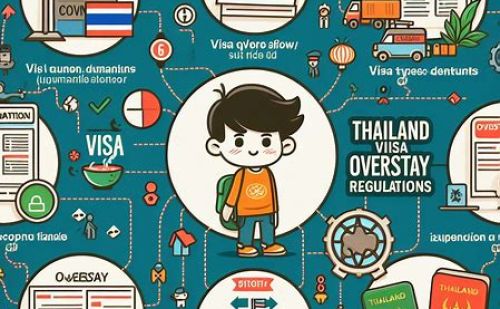Thailand Visa Overstay Regulations
hailand Visa Overstay Regulations
According to the web search results, overstaying your visa in Thailand can have serious consequences, such as fines, deportation, blacklisting, or even imprisonment. The penalties depend on the length and circumstances of your overstay. Here are some key points to remember:
Overstaying your visa is illegal and you will have to pay a fine of 500 Baht per day, up to a maximum of 20,000 Baht for overstays of 40 days or longer
If you overstay for more than 90 days, you will face a ban from re-entering Thailand for one to ten years, depending on how long you have overstayed
If you are caught overstaying by an officer, you may be taken to jail or the immigration detention center until you can arrange for a flight back to your home country
If you have a short overstay of a few hours or a day, you may be able to avoid the fine or the ban by explaining your situation to the immigration officer and apologizing
To avoid overstaying your visa, you should keep track of your visa expiration date and apply for an extension or leave the country before it expires. You can also monitor your visa status online or at the immigration office
What are the types of visa available for Thailand?
There are several types of visas available for Thailand, depending on the purpose and duration of your visit. Here are some of the most common ones:
Tourist Visa (TR): This visa is for those who want to visit Thailand for tourism, sightseeing, or visiting friends and relatives. It allows a stay of up to 60 days and can be extended for an additional 30 days. It can be either a single-entry or multiple-entry visa
Education Visa (ED): This visa is for those who want to study, attend seminars, or participate in training programs in Thailand. It allows a stay of up to 90 days and can be extended for up to one year. It requires a letter of acceptance from a Thai educational institution
Non-Immigrant Visa (B): This visa is for those who want to work, do business, or invest in Thailand. It allows a stay of up to 90 days and can be extended for up to one year. It requires a letter of invitation or employment from a Thai company or organization
Non-Immigrant Visa (O): This visa is for those who have a Thai spouse, child, or parent, or who want to retire or volunteer in Thailand. It allows a stay of up to 90 days and can be extended for up to one year. It requires proof of relationship, income, or volunteer status
Non-Immigrant Visa (O-A): This visa is for those who are over 50 years old and want to retire in Thailand. It allows a stay of up to one year and can be renewed annually. It requires proof of income, health insurance, and a criminal record check
Thailand Elite Visa: This visa is for those who want to enjoy long-term residency and privileges in Thailand. It allows a stay of up to 5 to 20 years, depending on the chosen package. It requires a membership fee and an application through the Thailand Privilege Card Company
Marriage Visa: This visa is for those who are married to a Thai citizen and want to live in Thailand. It allows a stay of up to one year and can be renewed annually. It requires proof of marriage, income, and a joint bank account
Retirement Visa: This visa is for those who are over 50 years old and want to live in Thailand. It allows a stay of up to one year and can be renewed annually. It requires proof of income and a bank account
Thai Permanent Residency: This is not a visa, but a status that allows foreigners to live in Thailand indefinitely without the need to renew visas or report to immigration. It requires at least three years of holding a non-immigrant visa, meeting certain qualifications, and passing a test on Thai language and culture
Thailand LTR Visa: This is a long-term resident visa that allows foreigners to stay in Thailand for up to 10 years without the need to renew visas or report to immigration. It requires at least five years of holding a non-immigrant visa, meeting certain qualifications, and passing a test on Thai language and culture
How do I apply for a Thai visa?
The process of applying for a Thai visa depends on the type of visa you need and the country you are applying from. According to the web search results, here are some general steps you can follow
Contact the Thai embassy or consulate-general in your country or the nearest one that oversees your country. You can find their contact information on the official website of the Ministry of Foreign Affairs of Thailand
Collect the required documents for your visa type. These may include your passport, visa application form, passport-sized photos, proof of travel, proof of financial support, proof of accommodation, letter of invitation or acceptance, health certificate, criminal record check, etc. The exact documents may vary depending on your visa type and nationality. You can check the details on the Thaiger guide on Thai visa types and requirements
Submit your visa application in person or online, depending on the availability of the service in your country. You may have to make an appointment or pay a fee before submitting your application. You can apply online through the official website of Thailand electronic visa if you are eligible.
Wait for your visa application to be processed. The processing time may vary depending on your visa type, nationality, and the workload of the embassy or consulate. You can check the status of your application online or by contacting the embassy or consulate.
Collect your passport and visa from the embassy or consulate, or receive it by mail or email, depending on the service provided. Make sure to check the validity and accuracy of your visa before traveling to Thailand.
How much will I pay in fines if my visa expires?
The amount of fines you will pay for overstaying your visa in Thailand depends on how long you overstay and whether you are caught by immigration or not. According to the web search results, here are some possible scenarios
If you overstay for less than 90 days and leave by an airport, you will pay a fine of 500 Baht per day, up to a maximum of 20,000 Baht for overstays of 40 days or longer.
If you overstay for more than 90 days and leave by an airport, you will pay the maximum fine of 20,000 Baht and face a ban from re-entering Thailand for one to ten years, depending on how long you have overstayed.
If you are caught overstaying by an officer, you may be taken to jail or the immigration detention center until you can arrange for a flight back to your home country. You will also pay the maximum fine of 20,000 Baht and face a ban from re-entering Thailand for five to ten years, depending on how long you have overstayed.
To avoid these penalties, you should keep track of your visa expiration date and apply for an extension or leave the country before it expires. You can also monitor your visa status online or at the immigration office
How much do I have to pay if I overstay my Thailand visa?
The amount of fines you will pay for overstaying your visa in Thailand depends on how long you overstay and whether you are caught by immigration or not. According to the web search results, here are some possible scenarios
If you overstay for less than 90 days and leave by an airport, you will pay a fine of 500 Baht per day, up to a maximum of 20,000 Baht for overstays of 40 days or longer.
If you overstay for more than 90 days and leave by an airport, you will pay the maximum fine of 20,000 Baht and face a ban from re-entering Thailand for one to ten years, depending on how long you have overstayed.
If you are caught overstaying by an officer, you may be taken to jail or the immigration detention center until you can arrange for a flight back to your home country. You will also pay the maximum fine of 20,000 Baht and face a ban from re-entering Thailand for five to ten years, depending on how long you have overstayed.
What happens if I overstay my visa for more than a year?
If you overstay your visa for more than a year in Thailand, you will face serious consequences. According to the web search results, here are some possible outcomes
If you leave by an airport, you will pay the maximum fine of 20,000 Baht and face a ban from re-entering Thailand for three years.
If you are caught by an officer, you may be taken to jail or the immigration detention center until you can arrange for a flight back to your home country. You will also pay the maximum fine of 20,000 Baht and face a ban from re-entering Thailand for ten years.
If you apply for a visa extension or amnesty, you may be denied and deported. You will also pay the maximum fine of 20,000 Baht and face a ban from re-entering Thailand for three years
To avoid these penalties, you should not overstay your visa in Thailand and leave the country before it expires. You can also monitor your visa status online or at the immigration office








